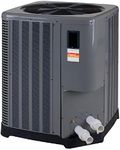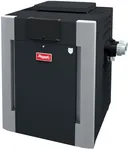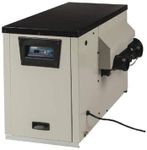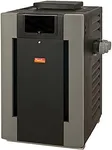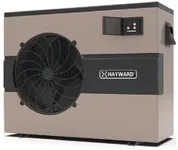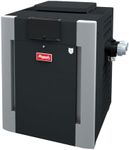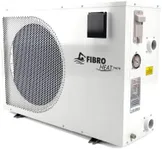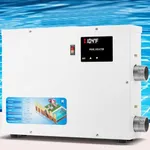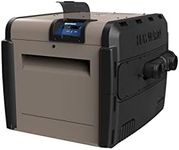Buying Guide for the Best In Ground Pool Heaters
Choosing the right in-ground pool heater can significantly enhance your swimming experience by extending your pool season and ensuring comfortable water temperatures. When selecting a pool heater, it's important to consider various factors such as the size of your pool, your climate, and your heating preferences. Understanding the key specifications will help you make an informed decision that best fits your needs.Heater TypeThere are three main types of in-ground pool heaters: gas heaters, electric heat pumps, and solar heaters. Gas heaters use natural gas or propane and are known for their quick heating capabilities, making them ideal for those who want to heat their pool on demand. Electric heat pumps are more energy-efficient and work by extracting heat from the air, but they may take longer to heat the pool. Solar heaters use energy from the sun, making them the most environmentally friendly option, but their effectiveness depends on the amount of sunlight available. Choose a heater type based on your heating speed preference, energy efficiency goals, and environmental considerations.
Heating Capacity (BTUs)Heating capacity, measured in British Thermal Units (BTUs), indicates how much heat the heater can produce. The higher the BTU rating, the faster the heater can warm up the pool. For small to medium-sized pools, a heater with 100,000 to 200,000 BTUs may be sufficient. Larger pools may require heaters with 300,000 BTUs or more. To determine the right heating capacity for your pool, consider the pool size, desired temperature increase, and how quickly you want the pool to heat up.
Energy EfficiencyEnergy efficiency refers to how effectively the heater converts energy into heat. More efficient heaters will have a higher Coefficient of Performance (COP) for heat pumps or a higher thermal efficiency percentage for gas heaters. An efficient heater can save you money on energy bills and reduce your environmental impact. Look for heaters with high efficiency ratings if you want to minimize operating costs and be more eco-friendly.
Climate SuitabilityThe climate in your area can influence the type of pool heater that will work best for you. Gas heaters perform well in any climate, including colder regions, as they are not dependent on air temperature. Electric heat pumps are more efficient in warmer climates where the air temperature is higher. Solar heaters are most effective in sunny regions with consistent sunlight. Consider your local climate when choosing a heater to ensure optimal performance and efficiency.
Installation and MaintenanceInstallation and maintenance requirements can vary between different types of pool heaters. Gas heaters typically require professional installation and regular maintenance to ensure safe operation. Electric heat pumps may also need professional installation but generally require less maintenance. Solar heaters can be installed by a professional or as a DIY project, and they have minimal maintenance needs. Consider the ease of installation and ongoing maintenance when selecting a pool heater to ensure it fits your lifestyle and capabilities.
Cost of OperationThe cost of operating a pool heater depends on the type of heater and the energy source it uses. Gas heaters tend to have higher operating costs due to the price of natural gas or propane. Electric heat pumps have moderate operating costs and are more energy-efficient. Solar heaters have the lowest operating costs since they use free solar energy. Evaluate the long-term operating costs of each heater type to find one that fits your budget and energy consumption preferences.
